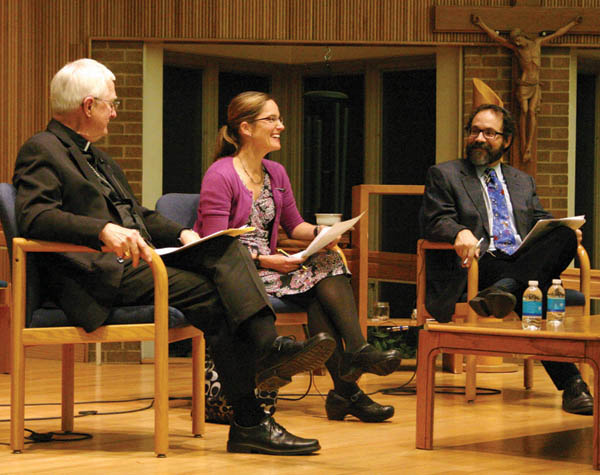By Celine Klosterman

IOWA CITY – Pope Francis offers humble leadership that emphasizes love of God and neighbor, speakers told more than 100 people at the Newman Catholic Student Center Nov. 20.
Bishop Martin Amos; Kristy Nabhan-Warren, an associate professor at the University of Iowa; and Gerald Sorokin of the Shulman Hillel (Jewish Center) at the university shared their impressions of the pontiff during “A Conversation on Pope Francis.” Deacon Tim Barry, executive director of the Newman Center, organized the event.
“I think Pope Francis’ gift to us is that he is very down to earth,” Bishop Amos said. The bishop of Rome has eschewed some “trappings” of the papacy, including a Mercedes and luxurious apartment.
Like Pope John Paul II and Pope Benedict XVI, the new pontiff appeals to young people, Bishop Amos said.
The bishop shared brief history about some of Pope Francis’ predecessors, beginning with Pius XII (1939-58). That pope wrote the encyclical “Divino Afflante Spiritu,” which opened up the Church to modern biblical criticism.
He was succeeded by Pope John XXIII (1958-63), who was meant to be a caretaker pope – a transitional leader, Bishop Amos said. The pontiff surprised people by calling the Second Vatican Council.
But he didn’t live to see its completion. Pope Paul VI (1963-78) oversaw the council’s conclusion and began implementing its mandates. He walked a fine line between Catholics who wanted Vatican II to go farther and those who thought it went too far, Bishop Amos said.
Following Pope Paul VI was Pope John Paul I, the “September pope,” who died 33 days after his election.
Later, Pope John Paul II (1978-2005) became the first non-Italian pontiff in 455 years. The beloved pope stressed the universal call to holiness and canonized more saints — 483 — than his predecessors did over the previous five centuries.
Because of Pope John Paul II’s long reign, Pope Benedict XVI (2005-13) was likely meant to be a caretaker pope, Bishop Amos said. Former prefect of the Congregation for the Doctrine of the Faith, Benedict XVI distinguished himself as an intellectual.
A November CNN article reported that Pope Francis has become the most talked-about person on the Internet, noted Nabhan-Warren, who teaches in the religious studies department at the University of Iowa. The pope has more than 10 million total followers on his Twitter accounts, which are published in nine languages.
She said some of her current and former students love Pope Francis, who is drawing positive media attention after the clergy sex abuse scandal and Vatican investigation of the Leadership Conference of Women Religious. “It will be interesting to see if this pope stems the tide of Catholics joining other religions,” or if he inspires more religious vocations, she said.
Later, Sorokin, executive director of Shulman Hillel, cited a portion of Pope Francis’ response to a reporter’s question about gay clergy: “Who am I to judge?” The pontiff’s comment didn’t change Catholic doctrine, but indicated it’s not up to him to determine a person’s worth, Sorokin said.
The speaker also referenced a Nov. 6 photo of the pope embracing a disfigured man in St. Peter’s Square. That gesture implied everyone should be treated with dignity, Sorokin said.
“This pope is communicating a genuine message of humility that resonates with non-Catholics.”
Jewish leaders have praised Pope Francis, who plans to visit Israel and has built on previous popes’ efforts to reach out to Jews. Pope Francis and his friend Rabbi Abraham Skorka of Buenos Aires co-authored a book in 2010 on their interfaith dialogue, “On Heaven and Earth.”
Later, in response to an audience member’s question about Pope Francis’ pastoral approach, Bishop Amos said the pope wants to first bring people to the love of Christ. Then, they will want to follow God’s law in order to avoid offending the Lord whom they love.







